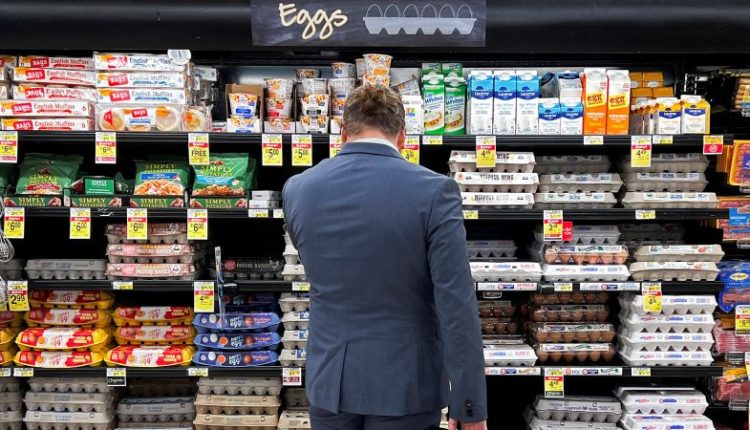Supermarket prices are no longer skyrocketing – except, of course, if you’re buying eggs.
Egg prices spiked by 28.1% in August from 12 months ago, easily the biggest increase out of any food item tracked by the Bureau of Labor Statistics.
The sticker shock in the egg aisle comes even as overall grocery prices are barely budging (up less than 1% in August from last year) and inflation cools across the US economy.
The main culprit for rising egg prices is a familiar one: bird flu.
Birds are getting sick, and that means fewer eggs and higher prices at the grocery store.
“Bird flu is the number one reason for higher prices, absolutely,” said Phil Lempert, a grocery industry analyst and editor of SuperMarketGuru.com.
Highly pathogenic avian influenza (HPAI), more commonly known as the bird flu, has impacted nearly 101 million birds across 48 US states since January 2022, according to the Centers for Disease Control and Prevention (CDC).
“Think about how they are housed: small spaces with lots of chickens,” said Lempert. “When one chicken gets bird flu, they’ve got to cull the entire flock. That’s the problem.”
That helps explain why total egg production in July fell 2.6% year-over-year, according to new data released Monday by the US Department of Agriculture.
The USDA also found that the number of egg-laying birds dropped for the second month in a row.
“Price impacts of the HPAI outbreak will be monitored closely,” the USDA said in August, adding that bird flu “contributed to elevated egg prices” this summer by “reducing the US egg-layer flock.”
Thankfully, eggs aren’t nearly as expensive as they were in late 2022 and early 2023. That bird flu-sparked price spike sent the average price of a dozen Grade A large eggs to a record of $4.82, according to the BLS.
Brian Moscogiuri, vice president at leading egg supplier Eggs Unlimited, told CNN in an email that overall inflationary pressures and feed prices have “eased” since that challenging period.
“However, we need time without major supply setbacks for production to recover,” he said.
Still, the current BLS average of $3.20 per dozen eggs remains high. Before Covid-19, eggs never hit $3 per dozen, according to BLS data going back to 1980.
Now Americans are paying nearly twice as much for eggs as before the pandemic. According to market intelligence platform Datasembly, the average price of eggs has surged 83% since October 2019.
Shoppers in some states have experienced even bigger price hikes for eggs, led by Minnesota (+137%), Missouri (+123%), Iowa (+116%), Oklahoma (+109%) and Alabama (+109%), according to Datasembly.
Zooming in to focus on just the past year, Datasembly found that egg prices have increased the most in Hawaii (+49%), Minnesota (+44%) and Alabama (+38%).
Prices are rising so rapidly that it has given some shoppers pause.
Moscogiuri said he has seen previously strong demand take a hit in recent weeks as retailers passed on high wholesale prices to consumers.
However, the good news is that wholesale prices have begun to fall sharply, a drop that should eventually trickle down to shoppers.
“If we can get through a 6-8 month stretch without AI (avian influenza), markets should return toward more normal, long-term average levels,” Moscogiuri said.
However, Kevin Bergquist, sector manager at the Wells Fargo Agri-Food Institute, warned in a recent report that prices will keep rising this fall and holiday season if bird flu infections continue.
Part of the problem may lie in consolidation. Like other industries, the egg industry has experienced a wave of mergers that has left the nation more reliant on only a handful of large producers.
As of 2020, the five biggest egg companies controlled between 36% and 40% of all egg-laying hens in the United States, according to a recent report by Farm Action, a group that fights corporate control of the food system.
Cal-Maine Foods, America’s biggest egg producer, controls about one-fifth of national egg sales following multiple acquisitions. When egg prices spiked to record highs in early 2023, Cal-Maine’s profit skyrocketed 718%. Cal-Maine did not respond to a request from CNN for comment.
“High egg prices in 2022 and 2023 were a product of price-gouging by dominant egg producers, who used the cover of inflation and avian flu to extract profit margins as high as 40% on a dozen loose eggs,” the Farm Action report concluded.
Basel Musharbash, managing attorney at Anti Monopoly Counsel, an antitrust law and policy firm in Texas, told CNN that consolidation has allowed the egg industry to take advantage of supply shocks.
“There is no buffer. Whenever there is a shock now, there is a shortage. That helps keep prices high at all times,” said Musharbash, the lead author of the Farm Action report.
Emily Metz, president and CEO of the American Egg Board, the national marketing organization for US egg farmers, pushed back against that argument by noting there are more than 3,250 commercial egg farms in the United States and hundreds of brands to choose from.
“The volatility we’ve seen in egg prices is based on many factors, most of which are beyond an egg farmer’s control,” Metz told CNN in an email, pointing to bird flu, strong demand and higher costs for feed, labor, fuel and packaging.
“America’s egg farmers are doing everything they can to keep their costs down while ensuring a steady supply of safe, wholesome, quality eggs that Americans love and can count on,” Metz said.
Egg price spikes hit lower-income families the hardest.
Consumers on food assistance programs like SNAP often use eggs as a primary source of protein because they’re typically cheaper than meat, said Lempert, the grocery industry analyst.
“Going from $2 per dozen eggs to $4 or $5 is a big jump on a tight budget,” he said. “When prices are high, I worry this population may not be getting enough protein.”
Read the full article here

